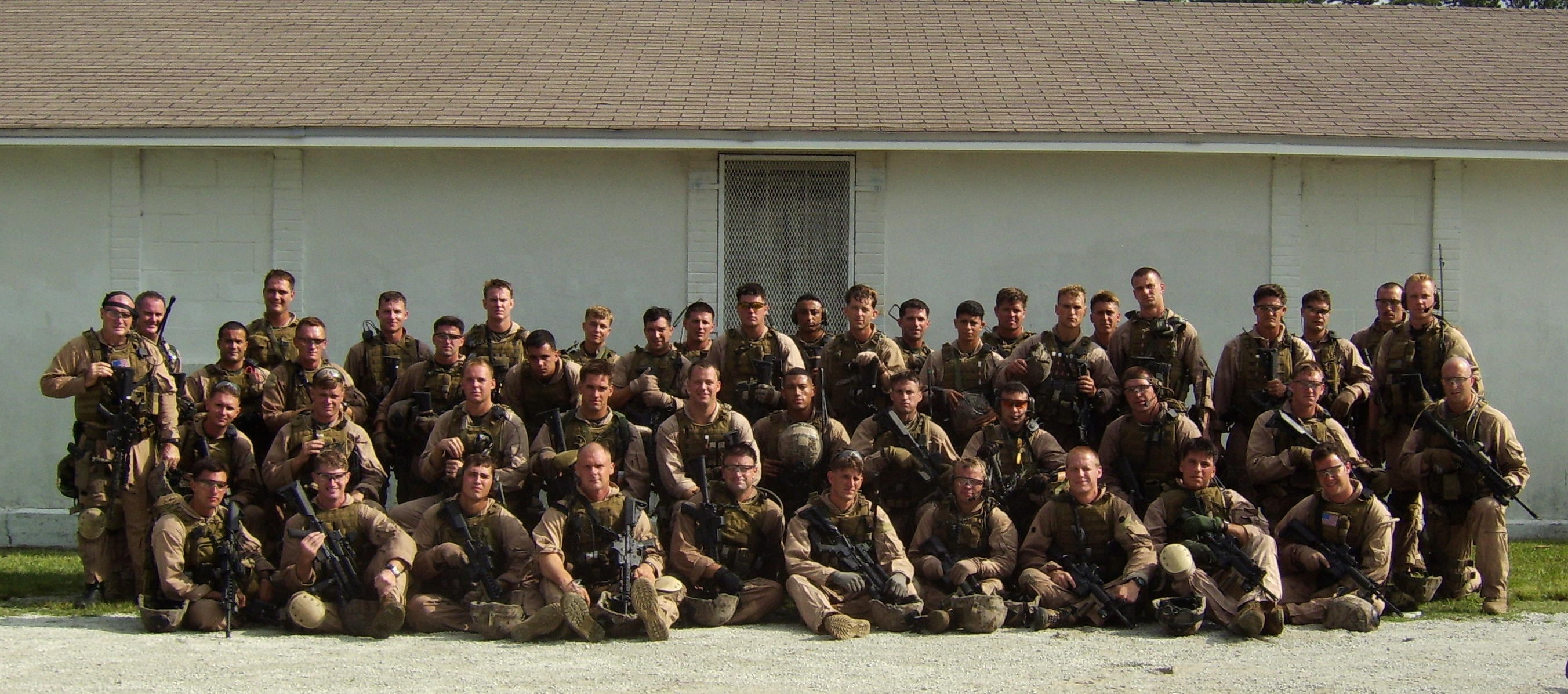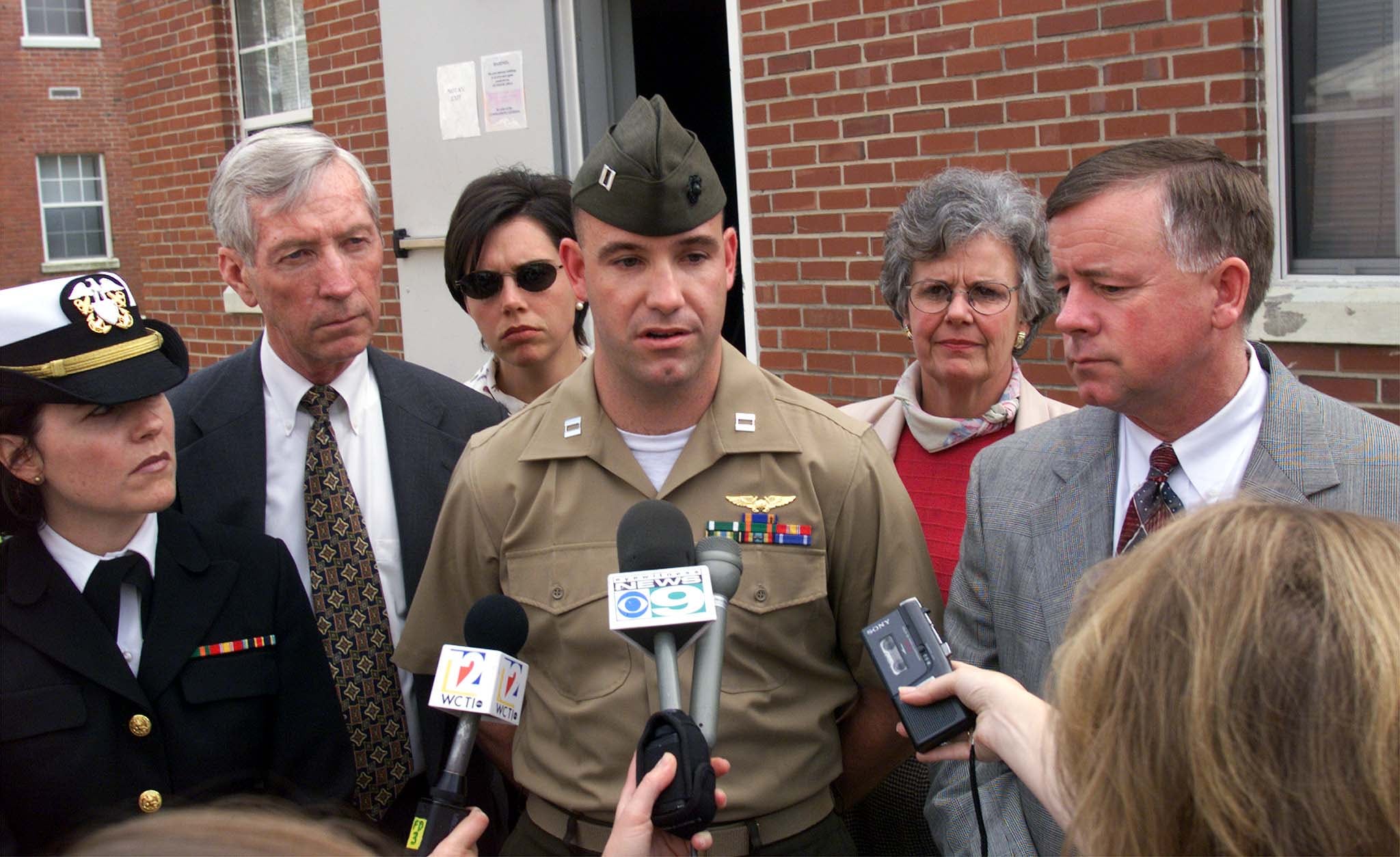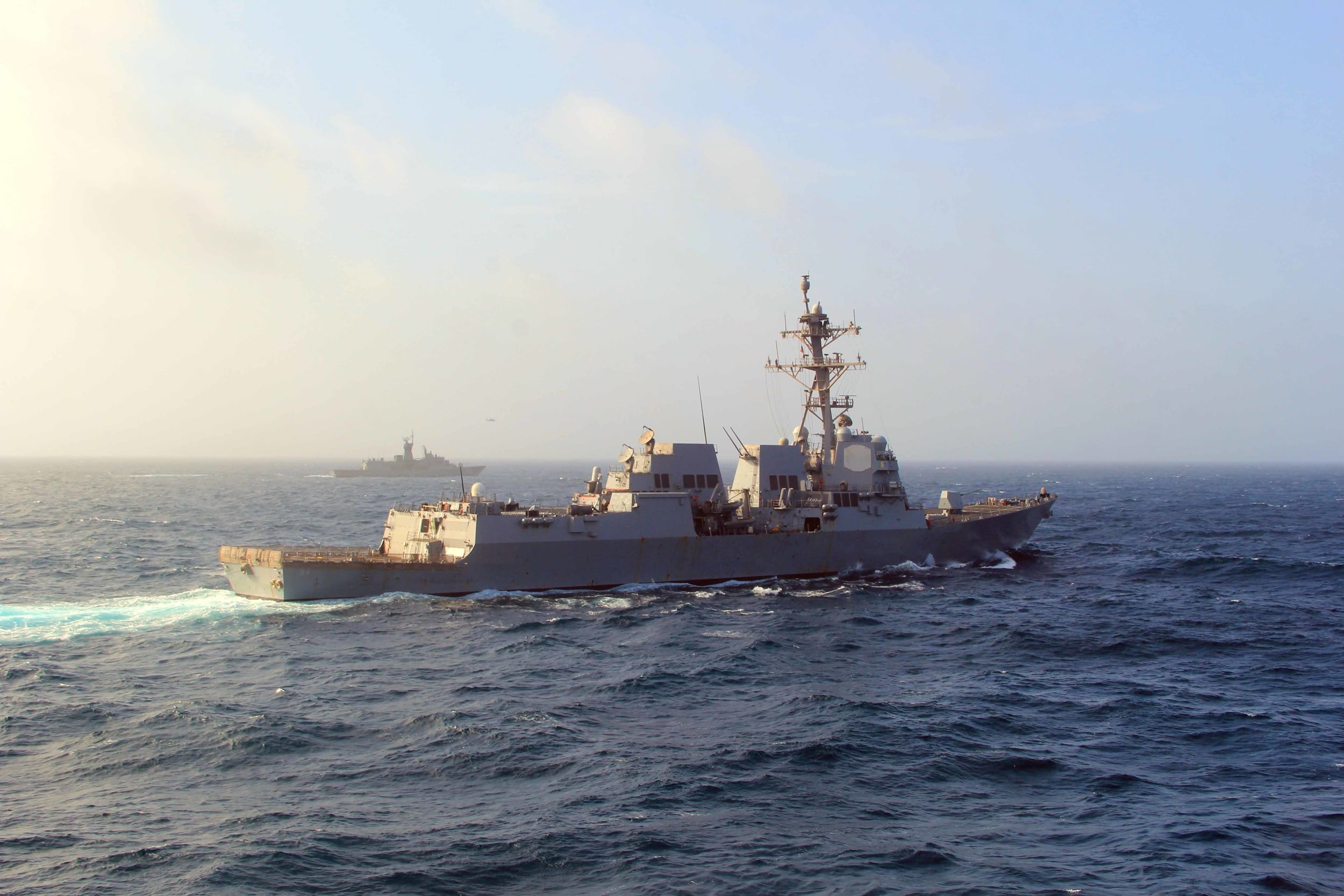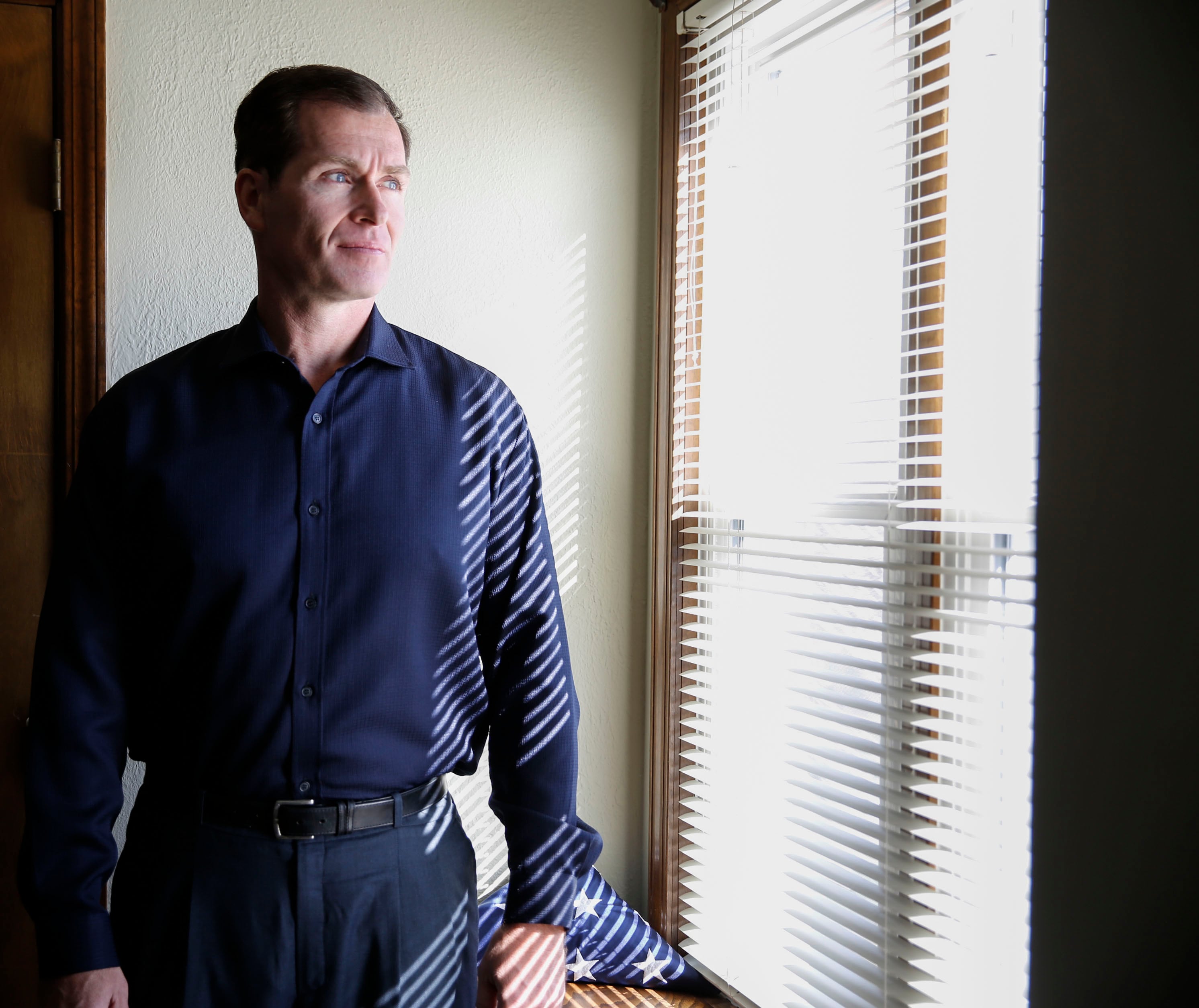
Editor’s note: This is the final installment in a five-part series.
KANSAS CITY, Missouri — The mission brief was meticulously detailed. Each objective, as well as every hospital and police precinct along the route, was plotted by satellite imagery. Body armor was optional. The mission commander would directly confront any threat. And should he become incapacitated, the instructions for escalating force were clear: shout, shove, shoot.
This was not Mosul, or Wanat. This was Kansas City’s urban core, where Fred Galvin owns, operates and maintains 13 automated cash machines. It is rife with gang-related violence, he explained. From 2000 until 2014, the annual murder rate here made it one of the nation’s 10 deadliest cities. Galvin spent more than half his life in the Marine Corps, much of that time leading small stealthy units in violent flashpoints abroad. A 45-year-old retired major, he now leverages his specialized military training as a lone-wolf entrepreneur filling a void in a poverty-stricken pocket of America’s heartland.
Galvin’s Arrowhead Capital is a fast-growing and surprisingly lucrative line of work, but if things hadn’t taken a devastating turn, had he not been betrayed by the institution he loved, he’d likely still be in the Marine Corps. But when he hung up his uniform in 2014, Galvin found it impossible to get a job, he said. Google his name. The search results underscore why.
Galvin was commander of Marine Special Operations Company Foxtrot in March 2007, when he became a central figure in one of the most publicized — and ultimately flawed — war-crimes cases since the Vietnam War. More than a year later, after a three-week military tribunal called a court of inquiry, Galvin and six of his Marines were cleared of all wrongdoing related to allegations they indiscriminately killed innocent Afghans when a suicide car bomber targeted their convoy. But long before they appeared in court, Fox Company’s Marines were publicly condemned by several senior military officers, sold out by those responsible for upholding the unassailable American ideal that anyone accused of a crime is innocent until proven guilty.
READ PART 2: The generals resisted MARSOC. Their Marines paid the price
READ PART 3: Marine commandos survived a nightmare. No one believed their story
READ PART 4: Embattled Marines came under fire — on the home front
Widespread media coverage depicted them as out-of-control cowboys. The public scrutiny was embarrassing. The prospect of going to prison was terrifying. And their 10-month legal battle was relentlessly stressful. One enlisted Marine, a Mexican national, was convinced his mother would be deported. Others recalled their superiors telling them “it doesn’t look good for you boys.”
Collectively, the fallout left them physically sick, psychologically broken and deeply embittered toward the leaders they blame for causing and perpetuating their anguish and shame, including men who’ve earned generals’ stars. For some like Galvin, there have been lasting professional setbacks, too.
But the betrayal from within, that shattered their trust in the institution. It defied the core values instilled in these men from the moment they joined the Corps: honor, courage, commitment. “This still haunts us,” one of those Marines explained, “because no one has publicly acknowledged we did the right thing that day. We did our jobs — and we were crucified for it.”
Galvin has been on a mission to restore honor for Fox Company, one that consumes him even when some suggest he should move on with a new life. But he’s not wired that way. He believes he owes it to his men to secure the full and public vindication they’ve never had.
Officially, the Marine Corps concluded in May 2008 that Fox Company’s Marines “acted appropriately” on the battlefield, that their use of force was justified as they encountered and escaped a complex ambush in the minutes following the suicide strike. No criminal charges were filed in connection those events. Afterwards, the case quietly disappeared from the spotlight.
To Galvin and others associated with this affair, “the statement we ‘acted appropriately’ is weak and leaves far too much to the imagination,” he said. “It’s easily interpreted as ‘we got away with murder.’ ... Even today, I have friends call me regularly saying this guy or that guy smeared our names, behind our backs.”
"American service members must never be treated this way, especially not by our own government's attorneys who, when the facts clearly proved we were innocent, argued … to send us to jail." Galvin said. "What happened to us … can't be seen as a success. The Marine Corps slogan of 'Mission first and Marines always' is indicative of how we served. And we respectfully request the record be set straight by a clear statement from the Corps … [saying] 'these Marines did not kill any Afghan civilians.' This will allow [us] to be reconciled inside the Corps and for the healing process to begin."
Marine Corps leadership has remained quiet on the matter.

Fox Company was the first-ever operational unit deployed into combat from MARSOC, the Marine Corps' component within U.S. Special Operations Command. To this day there are aspects of this fateful experience, including key courtroom testimony, that remain classified.
The court of inquiry was overseen by a panel of three senior Marine Corps officers, whose findings are outlined in a newly declassified report. It lays bare precisely how, in many ways, Fox Company's Marines were doomed from Day One, the victims of poor guidance and woefully insufficient support from their higher headquarters; and how in Afghanistan a tenuous situation became truly turbulent, culminating with their being ejected from the war zone, subjected to investigation, trial by public opinion and eventual adjudication.
Additional insights emerged through interviews with Fox Company Marines and others close to their case, many of whom agreed to speak only on condition of anonymity as some still hold sensitive jobs within the Defense Department and elsewhere in the federal government. Others cited lingering fears of violent retaliation by enemies affiliated with those they encountered on the battlefield eight years ago.
As the months and years ticked by following their formal exoneration, the MARSOC 7, as they became known, found an unlikely advocate in Steve Morgan, one of those three officers who oversaw the court proceedings. A lieutenant colonel at the time, Morgan retired from the military in July 2008. He remains troubled by the flawed investigation, which was carried out by an Air Force colonel and endorsed by an Army general; by the shoddy staff work overseen by two Army officers in theater, which he believes precipitated Fox Company's ouster; by the overzealous attempt to put Galvin and his men in prison; and finally by what he considers the unconscionable disloyalty to those sent into harm's way.
Morgan said he began his service on the court of inquiry ready to nail fellow Marines if they had committed war crimes. But he quickly was convinced that Fox Company had done nothing wrong and was being unfairly targeted. Like Galvin, he continues to pursue justice for Fox Company though his days in the Marine Corps are over.
In mid-2009, he wrote to the Defense Department Inspector General. Months prior, the IG's office completed an investigation clearing Army Maj. Gen. Frank Kearney, who bounced Fox Company from Afghanistan, of misconduct claims made by another of the Marines' allies, Congressman Walter Jones of North Carolina. The court of inquiry concluded that Kearney potentially influenced the Air Force colonel who recommended the Marines be charged with negligent homicide.
Why, Morgan asked the IG, were the court's findings not considered in its investigation? The court's report, he said to the IG, "is in direct contradiction with several areas of your report." It required involvement from his own congressman, Joe Pitts of Pennsylvania, before the IG addressed Morgan's questions, many of which the IG dismissed as irrelevant to its investigation into the general's conduct.
Kearney, who retired as a three-star general, told Military Times that even though the inspector general concluded he acted reasonably and within his authority, the unwelcome scrutiny "ruined my career." He did not wish to interviewed for this report.
The court's officers deemed it appropriate that Galvin was relieved of command and given an adverse performance appraisal. But "I have come to believe that conclusion was a mistake," Morgan told the records review board in his letter.
"Should he have been relieved of command? Yeah, because that's the code. It's an accountability issue," he said during an interview with Military Times. "But once all the mud cleared from the stream and you had drinking water again, [his superiors] should've gone back and added an addendum to Fred's fitness report. They didn't make the effort to look out for Fred and his Marines and be as objective as they could."
Morgan can become emotional while discussing Fox Company's experience. He and Galvin are alike in this regard and a few others. Both saw fierce combat during their careers, notably for Morgan during a 2004 tour in Afghanistan's Paktika province, where the unit he commanded was involved in an ambush that claimed the life of one of his troops and left 14 others wounded.
At the time he was appointed to the court of inquiry, Morgan was working at Marine Corps Forces Command in Norfolk, Virginia, as the deputy chief of staff for intelligence. In a handwritten questionnaire used by senior leaders to evaluate his candidacy, he noted that between two combat tours, the other occurring in Saudi Arabia and Kuwait during the 1991 Persian Gulf War, he encountered enemy fire 25 times and received two Bronze Stars for his combat valor, one during each campaign, plus a third for meritorious service in Afghanistan. Galvin received a Bronze Star for his battlefield valor in Iraq in 2005.
At each man's center exists a moral imperative to lead by example, a product of genetics and their respective upbringings as much as their military education and training. As officers, Morgan said, they are obligated to do right by those they lead and always to differentiate right from wrong. But in this case, Morgan said, too many officers let politics and personal ambitions cloud their responsibility to find the truth.
"Why am I still invested in this?" he said. "It is my duty. … Part of the soul of being a Marine is you trust all your officers. And what has happened here is a lot of officers, figuratively speaking, kicked to the ground and stomped on a bunch of enlisted men's heads. Fred's kids are hurting.
"The wounds go deep. … It's an injury to the soul."

Marine Capt. Joseph Schweitzer, seen here in 1999, endured endured circumstances similar to those experienced by Fox Company's Marines after he and three other Marine officers faced criminal charges in the tragic death of 20 skiers in the Italian Alps.
Photo Credit: RANDY DAVEY/REUTERS
Like Galvin and his Marines, Schweitzer and his colleagues experienced a rush to judgment. In the case of Fox Company, a military investigator favored the accounts of Afghan witnesses over those provided by the Marines. In Schweitzer's case, the military investigation into their incident relied heavily on eyewitness statements gathered by Italian police, not experts in understanding what causes aviation mishaps. Fox Company's Marines were called "cowboys." The men of EASY01 were accused of "hotdogging" and having a "taste for risk."
"When incidents like ours happen," said Schweitzer, who's now 47, "they take on a life of their own regardless of the facts. We had to wait until the trial to prove most of those witness statements were wrong and inaccurate."
He was cleared of the most serious charges, including negligent homicide, but pleaded guilty to destroying a cockpit video that showed him smiling several minutes before the accident. Schweitzer avoided jail time but was dismissed from the servicefollowing his trial in 1999.
In 2007 he was diagnosed with chronic post traumatic stress, marked by panic attacks, depression, a "lost sense of self" and professional setbacks, he wrote last year for the website Second Line Defense. Since then he has delivered regular lectures at the U.S. Naval Academy, from which he graduated in 1989, addressing his experience with thousands of future Navy and Marine Corps officers studying the principles of ethical leadership. Moral injury, he says, is "the undefined moment when what was is no longer."
"You struggle with the question: Am I a Marine? They don't want me to be a Marine. Am I killer? Who am I?" Schweitzer said. "That's a question Fred and his men will be asking for another 20 years maybe — until they come to terms with and understand where they are now."
Through his experience, Schweitzer believes "survivors heal survivors." He and Galvin have connected, Schweitzer said. "I wanted him to know 'Hey, someone's here who understands.' The important thing is to put your story in context and re-find yourself. Get beyond the tactical, raw details. You can't go backyards. Go forward. Tell the story, it'll set you free. And use the power of survival to understand your strengths."

Galvin went home to eastern Kansas. His military career was over. For the full year leading up to his retirement, he applied for job after job after job, domestically and abroad, tailoring his application each time. "The fact of the matter: Nobody was interested in hiring me, whatsoever," he said.
For the other Fox Company members who've gotten out — most barely in their 30s — it's been a mixed bag. Some caught on with defense contractors or the so-called "three-letter" government agencies that still have a stake in the war on terrorism. Others took a severe hit financially while fighting to stay out of prison. Three of the four men who were married are now divorced, including Galvin. "There was complete uncertainty," he said. "It looked like a jail sentence was pending — and that doesn't make anyone's marriage any easier. It was like putting people in a pressure cooker. Things were bound to explode."
Some have battled substance abuse and lasting trauma stemming from the dark memories of what they experienced during war. "I did multiple tours," said one of Fox Company's Marines, "and I deal with a bit from each one." During his first combat deployment after being reassigned from Fox Company, "I thought 'This is the one that's going to take me down,'" he said, recalling how he felt anxious yet gun-shy, scared to fire his weapon for fear that doing so would lead to trouble all over again.
One man said that to this day he is afraid even to walk into Wal-Mart. "I'm worried," he said, "that one of these extremists will find me and harm my family."
For those who've stayed in the Marine Corps and within MARSOC specifically, there's still a stigma. Fox Company's legacy is largely regarded as a blotch on what's become a very successful addition to the military's special forces portfolio. Some of the unit's Marines who've moved up the ranks use the experience for educational purposes, forever mindful that, right or wrong, there is much to be learned from what happened.
Their critics agree with that much. The lesson of Fox Company, as they see it: Don't be like these guys. Multiple Marines interviewed for this series pointed out what they regard as a pattern of unprofessionalism. Despite that the court of inquiry recommended no further punitive action be taken against Galvin, the Marine Corps referred him to a board of inquiry, an administrative hearing much like a trial that can result in an officer's involuntary separation from the service. The proceeding never happened, though. His attorneys successfully lobbied to make it go away, saying the court of inquiry proved there were no facts supporting any misconduct on Galvin's part.
Galvin checked out of MARSOC and returned to the reconnaissance community where he'd served for several years prior. In 2011, while advising a reconnaissance battalion commander in Afghanistan, he landed in trouble again. After a heated dispute with his commanding officer over how to safely provide fire support to Marines pinned down in an ambush, Galvin received another poor performance evaluation. "I sent letters to all eighty eight members of the House and Senate armed services committees along with a sworn statement and a polygraph," Galvin said. "On Christmas Day, a month after I contacted Congress, I got a gift-wrapped package from a three-star general saying I have to go to another board of inquiry."
This time there was a hearing to separate him from the service. The prosecuting attorneys brought up everything from Galvin's time with Fox Company, which by that point was five years in the past. He prevailed once more and in fact was assigned command of one of the Marine Corps' FAST companies, small anti-terror security units tasked with protecting Navy nuclear assets and reinforcing threatened American embassies and other government facilities abroad. In one of his last big moments as a commanding officer, a platoon of his Marines deployed into Libya after the 2012 terrorist attack in Benghazi that that killed U.S. Ambassador Chris Stevens.
Back in Kansas City, it's a bitter subzero day in early January. Galvin circulates throughout the inner city, stopping at several of his outdoor ATMs, anchored by a system he designed that makes them extremely difficult to steal.
Galvin and his security team roll up well armed and at all hours to help "mitigate risk." They restock the machines with $20 bills, 10s, 5s and 1s. Galvin inspects his security equipment and polishes their ATMs' exteriors. His customers want to feel safe when they drive up or walk up to make withdrawals, he explains.

The Kansas City police, he says, is a "strong ally." He's worked closely with them over the past year to better understand crime trends. Just weeks prior, in a neighborhood near two of Galvin's cash machines, a gunman standing on the sidewalk opened fire on a public bus as it drove by, pumping multiple rounds into the cabin and wounding a teenage girl inside. The incident was captured by the bus' surveillance cameras.
Galvin had considered putting a machine at this location upon launching Arrowhead Capital. " It is a good area," he says, "because although there is one bank, they do not have an ATM at all because of the risk. In the business community they term that as a barrier which prohibits a lot of investors from entering the market."
Along the route, Galvin talks at length about his military training and the applicable skills in his new line of work. He uses terms like "counter-reconnaissance" when surveying for anomalies that could indicate a threat is imminent, and "key terrain analysis" to describe how he identifies desirable locations for new ATMs.
One such lot has special meaning. It's the site of a future Conoco gas station and convenience store. The property was once owned by Galvin's grandfather, his Opa, a German immigrant who came to America with very little and built a life for his family, first as a butcher and later as the owner of a bar and grill here in what's become Kansas City's urban core. Relating the story proves difficult. There's pain associated with it.
The battle-hardened Marine swipes away his tears and apologizes. There's a long drawn breath of the winter air, and then it's time to move out.
"In my heart," Galvin said later, "I want to move on. If I can just get my life back."
He believes central to that, for him and his men, is a formal statement of vindication from the Marine Corps for Fox Company's actions in Afghanistan on March 4, 2007. That's been his quest ever since. Next year, MARSOC celebrates its 10th anniversary. How the story of its first unit sent to combat will be told remains to be seen.
Andrew deGrandpre is Military Times' digital news director.
Email:
adegrandpre@militarytimes.com
Twitter: @adegrandpre






